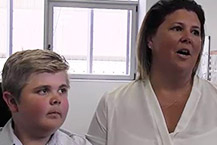It took almost two months for Klair Bayley to receive the results of genetic tests that confirmed her son Logan had the rare muscle-wasting disease Duchenne muscular dystrophy (DMD).

The new $47 million Laboratory Information System for State pathology provider PathWest diagnosed Logan's rare disease
That was 10 years ago and Klair recalls it being the longest two months of her life.
“It’s like the world stands still – you’re just holding your breath,” she says.
So Klair was pleased to learn that a new $47 million Laboratory Information System for State pathology provider PathWest – which is set to streamline pathology and genetic testing in Western Australia – could spare other families the ordeal of such a wait.
Klair, who along with Logan visited PathWest to take a look at the new system recently, says that any improvement in result turnaround times will make a big difference to families awaiting the results of genetic testing.
“Though it might not make the final diagnosis any less traumatic for families, it would lessen that period of uncertainty and enable them to begin accessing treatments, equipment and support services sooner,” she said.
Earlier diagnoses can also enable families to make informed decisions about future children.
Klair points out that most children with DMD aren’t diagnosed until they are about five years old, by which time their parents might have gone on to have more children with the condition.
“Some families have three of four boys with Duchenne,” Klair says.
People with other rare genetic conditions can face a similar – or even longer – wait for answers with some individuals reaching adulthood without a diagnosis.
So PathWest’s new Laboratory Information System will be an important tool for clinicians and researchers working in the rare diseases field.
It is the same system used by the renowned Mayo Clinic in the US and will be rolled out across PathWest’s 56 collection centres, 23 branch laboratories and five teaching hospital laboratories, providing a seamless pathology data connection across the State.
Western Australia’s four genetics databases, which were previously located at each of the main teaching hospitals, will be migrated to the new system. This, together with the automation of much genetic testing, will ensure patients with rare genetic diseases receive results faster.
Duchenne Muscular Dystrophy is a rare and fatal muscle-wasting disease. It is almost exclusive to boys, affecting about one in 3,500 newborn males and one in 50 million girls.
For more information about the condition visit Save our sons Duchenne Australia (external site).